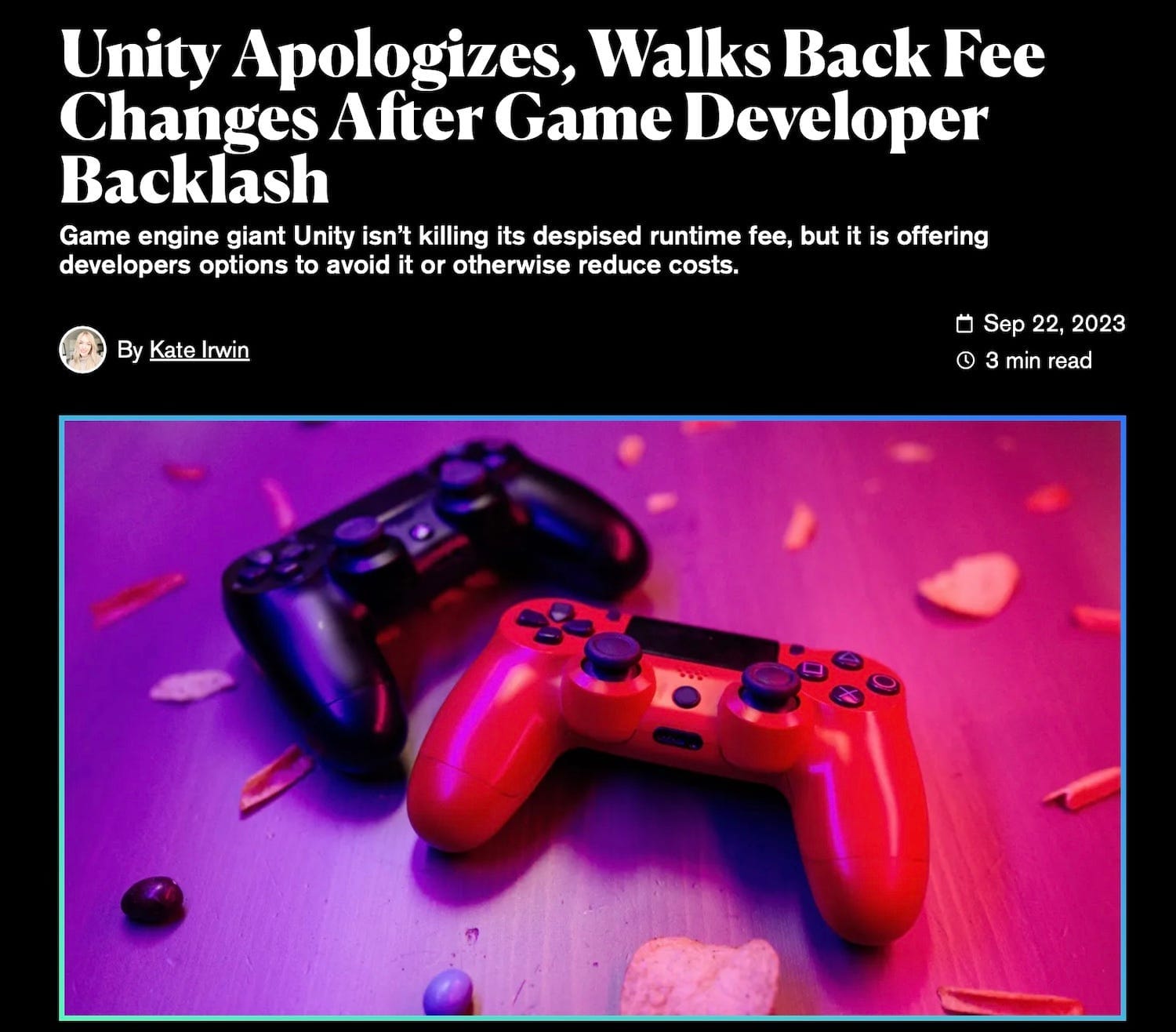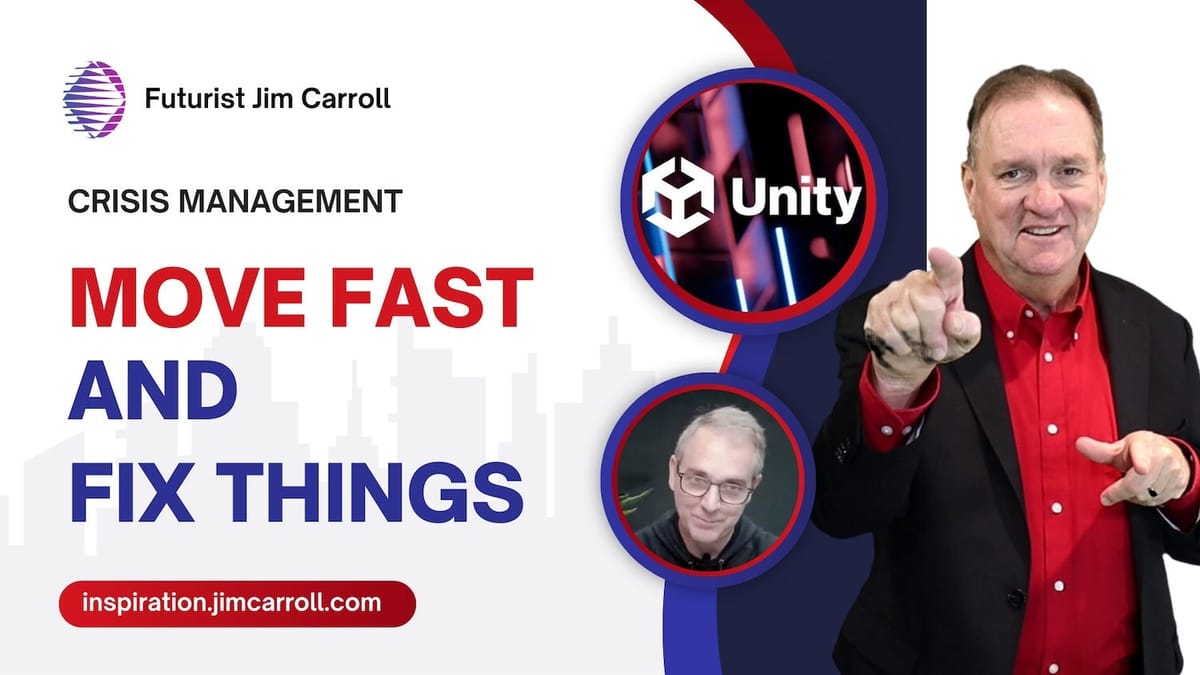Steve Ballmer, the VP of Microsoft who was the driving force next to Bill Gates in the early rapid rise of the organization, understood the critical importance of "developers." Most modern-day software and tech company CEOs do not - in particular, folks like Elon Musk The president of gaming engine Unity Create, Marc Whitten, certainly does. His recent sincere apology and response to a self-imposed developer crisis give a textbook example of how to deal with an egregious mistake once your customers let you know - in no harsh terms - that you were completely wrong with your actions.
It offers an example that when you break things, you've got to move fast to fix things because we live in a world in which egregious mistakes can suddenly spiral out of control. We now live in a future in which you no longer fully own your future - your customers or external business partners do.
The backstory. Developers? They're the folks who write the software code or programs that add functionality to or enhance the platforms of larger software systems. Steve Ballmer understood that ht more people who could write software around the Windows platform, the better Microsoft would do in the future. Famously, he was known for singing the praises of developers on stage in a rather offbeat way, to say the least, such as this video captured at a Microsoft Developers conference many years ago.
This longer version of the video puts a little more context on it. No, he did not have a heart attack on stage, and in fact, became well known for a continuous series of rather enthusiastic presentations.
The modern-day era? Elon Musk? For all his brilliance, he truly is an idiot at times. Months ago, he decided that no developer should have the right to add functionality to Twitter unless they were prepared to pay a pretty exorbitant fee. Never mind that there were already many software developers who had built a business around the ability to add functionality to Twitter. They were rather directly impacted when he suddenly - and capriciously - 'pulled the plug.' Suddenly their software stopped working; suddenly, their entire business and business model were completely destroyed; suddenly, overnight, they no longer had a business.
The impact? Consider the folks at TapBot, a small software company that had built some wonderful software that made using Twitter so much better. Suddenly, one day, they had a business. The next day, they did not. Read the story here - "Twitter third party apps intentionally blocked." In effect, this small business, and many others, saw their entire future decimated, due to the erratic nature of Musk.
Over to Unity. It's the backbone 'engine' that supports many popular computer games. Some weeks back, it suddenly announced a significant new fee structure that would apply to the developers writing those games for the platform. There was no notice; no discussion with the developer community; the fees were significant, particularly for small computer game software companies, and were rather undiplomatically launched. The pushback from the developer community was swift and severe, to say the least. So severe, in fact, that in short order, Unity apologized, and walked back the proposed changes. President Marc Whitten went onto a popular podcast and took part in a rather excruciating session with the developer community to try to win back their trust.

Will that trust be forthcoming in the future? It's hard to say - significant damage has been done. Noted one developer after the interview:
WB Games writer Mitch Dyer called the news a “solid change” on Twitter, but hinted that Unity could invoke similar changes again in the future.
“It feels like they’re putting the rug back in place and hoping you just stay standing on it until the next time they give it a pull,” Dyer said.
This situation seemed to follow a recent pattern of what seems to be a 'war on developers.' After the Twitter debacle, Reddit found itself in the crossfire of a disastrous rollout of new policies aimed at 'community moderators' - not real software developers, but folks who support the platform. There have been many other examples as well.
Why does a developer matter? Simply put, they add functionality to your product; they enhance it. They add features that you might not have thought of, or they simply make your product better. In many other cases, they are simply relying on the fact that your business model has invited them to write software on top of your platform - they are a core part of your entire functionality. To make your future successful, you need to make them successful. Developers are in some cases, actual customers; in other cases, they are an extension of your business.
It is a relationship built on trust. Kill the trust - and you can kill your future.
Consider Twitter. Elon Musk talks of a grandiose scheme of developing what he calls an 'everything app' - an idea that he would build so much functionality into the Twitter platform that people would use it for shopping, banking, home management, and more. He has just about ZERO chance of accomplishing this at this point because achieving that goal would require the participation of a massive number of developers - few of whom would trust him with anything at this moment in time. He has destroyed any level of trust he might have had, and with that, has destroyed the opportunity for any sort of grandiose future for Twitter.
All of this comes on the heels of a world in which many organizations make rather bone-headed moves that end up infuriating their customers, only having to walk it back later. Years ago., I wrote a long blog post about the importance of dealing quickly with self-imposed customer relationship debacles, and it is worth a read.
https://jimcarroll.com/2017/03/your-customers-know-more-than-you-do-do-you-accept-that-and-what-will-you-do-about-it-here-are-10-things-you-should-do/
Imagine that you are a big company. Imagine that you roll out a new piece of software that was supposed to make things better for your customers.
Imagine that it doesn't do that -- and it makes things worse, in that a feature that existed for your best customers has now disappeared. Even worse -- those very same customers now have to pay a fee to do what they could previously do for free. In other words, imagine that you've broken a customer system, and you are now penalizing those customers for your mistake.
Imagine this: you've tried to make things better, and you've only made them worse. Does this happen in the real world? Alarmingly, often. I'm going through this exact type of experience right now with a billion-dollar company that I deal with regularly.
Out of respect -- since I think their CEO is a smart guy -- I won't name names. I will, however, offer up my advice on how to respect, not mistreat, your customers. The fact is, in this hyper-connected world, your customers know a lot more about what is going on than you do. If you fail at customer service or customer interaction, it can go public in a big way.
You don't just need to be excellent in customer relationships - you need to be relentlessly excellent.
These are the fundamental truths of the new customer relationship.
- Fix things fast, because things can break fast. As things go wrong, fix them fast. Have a communications plan. Be prepared to reassure the customer quickly. In this new era of hyper-information feedback, don't let the customer sit and stew for a moment -- proactive information and proactive action is the only weapon you have, and you have to use it.
- Adopt customer niceness as a core virtue during the pain period. There are rules fees and structures that can exist in any customer relationship. But let everyone on the team know that there are likely some things that are going to have to be waived during the rollout. The core virtue is, "We're going to be nice to the customer because we know it is not the customer's fault that things have gone wrong."
- Admit that mistakes will happen. It's ok. It's the 21st century. Bad things go wrong all the time. Accept that, and use that as a go-forward strategy. "Things will go wrong and we will work to fix them fast" is a better strategy than "We plan on rolling it out and holding our breath that things don't get messed up."
- Don't hide from the customers. Customers today can turn on you in an instant. Rumors, stories, and misinformation can abound. The customer has a lot of information, and might not always be reading it right -- but they can certainly make it go wrong in a hurry. A clear, open, honest, reactive strategy with the customer is in your best interest. More communication is the best rule.
- Be open. Solicit feedback - get the customers on side. Don't just roll out new ideas, technologies, services or other things, and hope for the best. Know that there will be problems, issues, and things that will go wrong. Start out on the right foot with the customer base when things go wrong by admitting that you screwed up, and by seeking their input, and guidance. The new business world is all a beta -- Google gets this, and you should get this too.
- Turn customers into fixers. The customer is a new customer. They expect operational excellence, and if they don't get it off the bat, they are prepared to help fix it. The complexity of a new customer software system can undergo all kinds of testing internally, but some things will never show up until it goes live. That's why you want to recruit the customer as a problem solver. Turn it from a "bad rollout of new software" into something different, by letting the customer know that you want them to help stress test the system and find the things that aren't working quite right.
- Get everyone inside on the same page. Let everyone throughout the organization know that something new is going to be happening that could cause customer stress. Get them to understand that the new JOB #1 is Customer-Destressification.
- Have an escalation plan. As things go wrong, be prepared to pump them up the chain in a hurry. Have a team ready to analyze what the customers are saying, do triage on the big ones, and work on them quickly.
- Empower people with niceness. Customer-centricity and the instant age demand that the customer be made happy -- quickly. Give staff who have not previously had the authority, the authority to do things to the customer that are nice. That will help to ease the early part of the "pain process."
- Learn from the experience. Learn from this rollout to figure out how to do it better the next time.
In today's hyper-competitive environment, your customer relationship can be fleeting at best. They often know more about your market than your staff does. Act accordingly, or you look like a fool -- and you end up losing customer loyalty.
Futurist Jim Carroll believes that good crisis management is as important as a good business model. Things can break fast - and you need to fix things fast.

